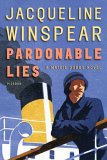Summary | Excerpt | Reading Guide | Reviews | Beyond the Book | Readalikes | Genres & Themes | Author Bio

PART ONE
London, September 1930
ONE
The young policewoman stood in the corner of the room. Plain
whitewashed walls, a heavy door, a wooden table with two chairs, and one small
window with frosted glass rendered the room soulless. It was a cold afternoon
and she'd been in the corner since coming on duty two hours ago, her only
company the rumpled and bent girl sitting in the chair that faced the wall.
Others had come into the room to sit in the second chair: first, Detective
Inspector Richard Stratton, with Detective Sergeant Caldwell standing behind
him; then Stratton standing while a doctor from the Maudsley Hospital sat before
the girl, trying to get her to speak. The girl—no one knew her age or where she
had come from because she hadn't spoken a word since she was brought in this
morning, her bloodstained dress, hands and face showing a month's worth of
dirt—was now waiting for another person who had been summoned to question her: a
Miss Maisie Dobbs. The policewoman had heard of Maisie Dobbs, but with what she
had seen today, she wasn't sure that anyone could get this young scrubber to
talk.
The policewoman heard voices outside the door: Stratton and
Caldwell and then another voice. A smooth voice. A voice that was neither loud
nor soft, that did not need to be raised to be heard or, thought the
policewoman, to get someone to listen.
The door opened and Stratton came in, followed by a woman she
presumed to be Maisie Dobbs. The policewoman was surprised, for the woman was
nothing like she had expected, but then she realized that the voice had revealed
little about the owner, except that it had depth without being deep.
Wearing a plain burgundy suit with black shoes and carrying a
worn black leather document case, the visitor smiled at both the policewoman and
Stratton in a way that almost startled the uniformed woman, as her eyes met the
midnight-blue eyes of Maisie Dobbs, psychologist and investigator.
"Pleased to meet you, Miss Chalmers," said Maisie, though they
had not been introduced. The warm familiarity of the greeting took Chalmers
aback. "Brrr. It's cold in here," added the investigator, turning to Stratton.
"Inspector, can we bring in an oil stove? Just to take the edge off?"
Stratton raised an eyebrow and inclined his head at the unusual
nature of the request. Amused at seeing her superior caught off guard, Chalmers
tried to hide a grin, and the seated girl looked up, just for a second, because
the woman's voice compelled her to do so.
"Good. Thank you, Inspector. Oh—and perhaps a chair for Miss
Chalmers." Maisie Dobbs removed her gloves, placing them on top of the black
bag, which she set on the floor, before pulling a chair around so that she was
seated not opposite the girl, on the other side of the table, but close to her.
Strange, thought Chalmers, as the door opened and a constable
brought in another chair, left the room, and returned with a small paraffin
stove, which he placed by the wall. They exchanged quick glances and shrugged
shoulders.
"Thank you," said Maisie, smiling.
And they knew she had seen their furtive communication.
Now, sitting alongside the girl, Maisie said nothing. She said
nothing for some time, so that after a while Chalmers wondered what in heaven's
name she was there for. Then she realized that the Dobbs woman had closed her
eyes and had changed her position slowly, and though she couldn't put her finger
on it, it was as if she were talking to the girl without opening her mouth, so
that the girl—as if she couldn't help herself—leaned toward Maisie Dobbs.
Blimey, she's going to talk.
"I'm getting warmer now." It was a rounded voice, a west-country
voice. The girl spoke deliberately, with rolled r's and a nod when her sentence
was finished. A farm girl. Yes, Chalmers would have pegged her for a farm girl.
From Pardonable Lies by Jacqueline Winspear. Copyright Jacqueline Winspear 2005. All rights reserved. No part of this book maybe reproduced without written permission from the publisher.




We have to abandon the idea that schooling is something restricted to youth...
Click Here to find out who said this, as well as discovering other famous literary quotes!
Your guide toexceptional books
BookBrowse seeks out and recommends the best in contemporary fiction and nonfiction—books that not only engage and entertain but also deepen our understanding of ourselves and the world around us.